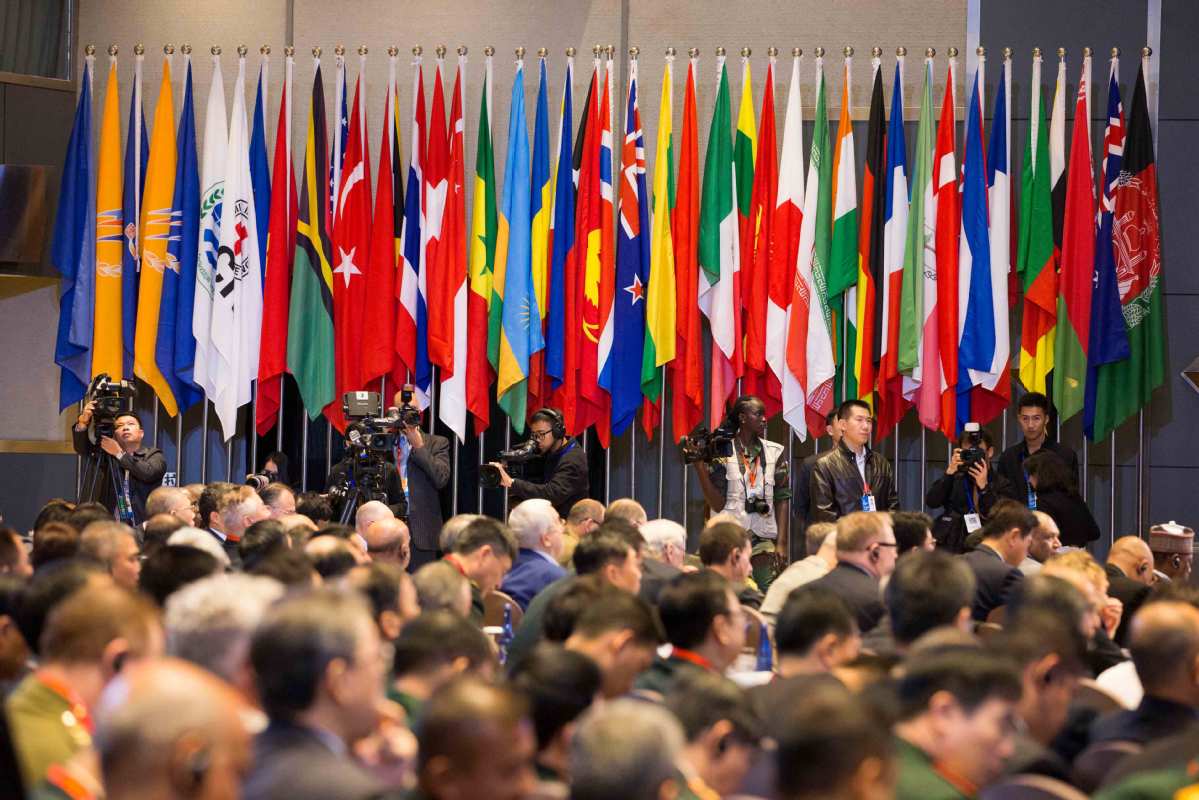Unity is key to anti-terrorism fight, forum told
By Zhang Zhihao | China Daily Global | Updated: 2019-10-25 09:23

Officials, experts agree on need for broader international cooperation to tackle problem
Counterterrorism was among the top global security issues highlighted this week at the 9th Beijing Xiangshan Forum, as high-ranking military officials and experts discussed new developments and challenges.
Complex problems ranging from the rising level of online terrorist activity to state-sponsored terrorism will require more holistic approaches, a stronger consensus and deeper cooperation among countries, they said in speeches and panel sessions at the forum, which ran from Sunday to Tuesday in the capital.
Sergei Shoigu, Russia's defense minister, warned in a speech on Monday at the forum that despite the defeat of the Islamic State group in Syria, the threat of terrorism still looms large and is spreading to Asia and Europe, especially to Southeast Asia.
In recent years, ISIS supporters have identified Malaysia, Singapore, the Philippines and Indonesia as their next strategic foothold, given the region's interconnectivity, large Muslim population and history of terrorist activities.
According to RAND Corp, a US think tank, the numbers of ISIS fighters, organized training programs and propaganda videos originating from the region have grown steadily in recent years. The fact that hundreds of ISIS fighters from Southeast Asia who had been abroad are returning home was also called a challenge.
Shoigu said it is time for the international community to unite its efforts to meet the challenges and tackle extremist ideals. "The fight against terrorism should not be politicized to achieve special goals, and mechanisms must be found to fight it globally," he said.
Major General Wang Jingwu, the president of the National University of Defense Technology's School of International Relations, said that in 2017, the world faced around 8,580 terrorist attacks, leading to more than 18,700 deaths.
"Terrorists are becoming more globalized, internet-savvy and younger," Wang said at a forum panel on global counterterrorism efforts. "This poses serious challenges to global counterterrorism efforts because terrorists are becoming more scattered and elusive, and they can carry out surprise attacks in a wide range of locations."
Apart from expanding their presence in countries such as Turkey, the Philippines, Indonesia and Malaysia, terrorists are also moving into the virtual realm by spreading propaganda, attracting recruits and financing their operations via social media and the darknet, Wang said. Darknet refers to a computer network with restricted access used primarily for illegal purposes.
"The internet is now a new battlefield for counterterrorism, and (fighting terror) is a herculean task that will require considerable effort from the global community," he said.
However, the global fight against terrorism is losing steam as the United States, one of the main pillars of counterterrorism, has recently switched its strategic priorities to competition between major nations, Wang said.
To complicate matters, some countries are abusing the definition of terrorism and counterterrorism mechanisms to advance their own national goals, he said.
"Terrorists in one country might be considered 'freedom fighters' and get support from another country. If we can't even have a common understanding of what a terrorist is, the future of global counterterrorism efforts will be very difficult."
Wang added that more counterterrorism operations under the United Nations framework, increased intelligence-gathering capabilities, online and legal collaboration among nations, and elimination of radical thinking are also keys.
Major General RPS Bhadauria, a distinguished fellow at the United Service Institution of India, said the social and psychological makeup of a terrorist is extremely complex, with many new recruits being young, well-educated and middle class - demographic characteristics traditionally thought to be less susceptible to extremist ideals.
"We can kill a terrorist, but what we really need to do is kill the idea behind the terrorist," Bhadauria said.
Vladimir Norov, secretary-general of the Shanghai Cooperation Organization, said eliminating the financing behind terrorism is also a key way to thwart its influence. He said the SCO is collaborating with the United Nations and the Association of Southeast Asian Nations to jointly tackle narcotics trafficking, which is a major money source for terrorists.
Launched in 2001, the SCO is an intergovernmental organization to promote effective cooperation and maintain regional stability. It currently has eight member states - China, Russia, India, Pakistan, Kazakhstan, Kyrgyzstan, Tajikistan and Uzbekistan - while Afghanistan, Belarus, Iran and Mongolia are observer states.
Last year, the SCO anti-terrorism department thwarted more than 360 crimes of a terrorist nature, neutralized more than 80 clandestine terrorist cells and eliminated 67 combatants, including 10 leaders of terrorist groups.
In addition, Norov said, "The SCO's experience in fighting illegal drug trafficking is becoming more and more in demand on the regional and international levels.
"Afghanistan continues to maintain the status of the largest producer and supplier of opiates in the world, the proceeds from the sale of which is one of the main sources of terrorism financing," Norov added. "One of the key factors in strengthening stability and security in the region and in the world as a whole is the speedy resolution of the conflict in Afghanistan."
Zhang Jiadong, director of Fudan University's Center for South Asian Studies, said that although terrorism might not be exterminated, it can be curbed through joint efforts and by achieving peace and economic development in distressed regions.
























